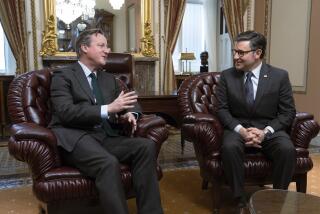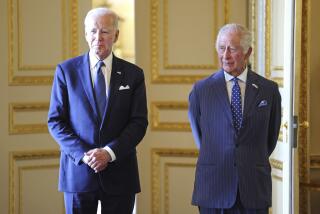Blair May Nudge Bush to Reach Out on Iraq
LONDON — Prime Minister Tony Blair has been President Bush’s staunchest ally in the Iraq war. But when the two meet Friday at the White House, chances are the British leader will give his American partner a message: Shift course to put a more international face on the struggle to rebuild Iraq.
Blair arrives in Washington at a time when the conflict seems at its bleakest point in terms of rising casualties and dwindling opportunities to win over the Iraqi public. In fighting this month, more than 80 members of the U.S.-led coalition have been killed, the highest fatality rate since the invasion last year.
Many of Blair’s Labor Party colleagues have doubts about Britain’s participation in the war and the postwar transition effort that appears to be unraveling.
Meanwhile, Conservative and Liberal Democratic opponents in Britain are sharpening their criticisms about the conduct of U.S. forces and questioning whether Britain wields any weight as the junior partner in the alliance.
The Liberal Democrats’ shadow foreign secretary, Menzies Campbell, called attention Wednesday to the heavy fire laid down by U.S. Marines in the Iraqi city of Fallouja after the slaying and mutilation two weeks ago of four American private security contractors. Hundreds of Iraqis were killed in the fighting that followed, Iraqi and U.S. spokesmen said, and Iraqis have charged that women and children died in addition to armed insurgents.
“Heavy-handed military action in Iraq will invite opposition, create support for radical elements and undermine the long-term political objectives of a democratic Iraq,” Campbell said.
“When the prime minister meets President Bush, he must impress upon him the need to ensure that military force is targeted, specific and proportionate,” Campbell said. “Anything else will simply play into the hands of the worst elements in Iraq.”
British government spokesmen said there were no differences between Blair and Bush on the conduct of the war.
Nevertheless, Rosemary Hollis, a Middle East expert at the Royal Institute of International Affairs, said she expected Blair to make the case privately to Bush that the war requires more international involvement and a “much bigger role” for the United Nations. That would be in keeping with Blair’s longtime preference for a broad-based multilateral approach to Iraq, she said.
Blair’s first stop in the United States is to be at United Nations headquarters today, where he is to confer with U.N. Secretary-General Kofi Annan.
Vernon Bogdanor, a professor of government at Oxford University, said the White House visit has a political implication for both leaders, who have dug in their heels in Iraq despite much international opposition and in the face of increased uncertainty in their own countries.
“They have a mutual interest to help each other, frankly,” he said. “They’re in the same boat.”
Blair has set himself apart in Europe with his strong support of Bush and the war. Blair’s Labor is the continent’s only social democratic party to back the invasion, and if Bush were to be rejected by U.S. voters in November, it might make the British leader’s own position seem alone and tenuous. Members of his party are more ideologically inclined toward the Democrats.
“Faced with this week’s embarrassing White House photo call, Blair may feel how the two war leaders’ political fates are horribly intertwined,” wrote Polly Toynbee, a columnist in the left-leaning Guardian. “Blair people say they pray for a Kerry win, but a Bush fall would have perilously alarming symbolism inside No. 10,” a reference to the prime minister’s Downing Street residence.
Nevertheless, British analysts have noted Blair’s one-day meeting at the White House will be shorter and more formal than earlier get-togethers with Bush.
The timing of the trip was dictated in part by the U.S. presidential election. Blair did not wish to come later in the year when the campaign will be at its peak, and when his presence might be construed as a political endorsement.
Blair has been in power since 1997, making him one of Britain’s longest continuously serving prime ministers in the last century. He is not required to call a general election until 2006.
But growing discontent over the war is weakening his position inside the Labor Party and making it more difficult to pursue his domestic and foreign-policy goals, Bogdanor said.
Britain has 11,000 troops in Iraq and has suffered the second-highest number of deaths among the members of the U.S.-led coalition: 59 since the war began. With the casualty toll rising and Iraq looking less stable by the day, the war continues to draw withering criticism in much of the British media.
Simon Jenkins, writing Wednesday in the center-right Times of London, labeled the occupation after one year “military madness.”
“A nation cannot be driven to democracy by Cobras and Apaches,” he wrote, referring to military helicopters. “An orderly withdrawal is now urgent. Yet all Mr. Blair can do is fantasize and abuse his critics.”
More to Read
Sign up for Essential California
The most important California stories and recommendations in your inbox every morning.
You may occasionally receive promotional content from the Los Angeles Times.










